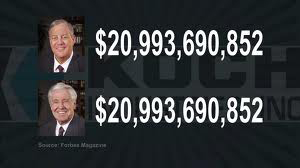Money laundering Koch Brothers fined $16 million

Charles and David Koch are each worth over $20 billion dollars. Calculating an interest rate on their money at 10% means they each earn $5,479,000 a day (that’s 5 million, 475 thousand every day of the year) – plenty of money to spend around the world to destroy collective bargaining rights for public sector workers. They’ve already taken out the private sector unions. Their big guns are now aimed to you.
We all need a union and now thanks to the state of California, the chances have improved we may be able to hold on to our collective bargaining rights.
A strongly worded editorial – A Victory Against Dark Money – was published in Sunday’s New York Times, supporting California’s decision to impose $16 million in penalties and fines against a shadowy organization – “the key nonprofit in the Koch Brothers’ dark money network” – that illegally dumped millions into the effort last year to curtail the power of unions.
We copied and pasted the article below because sometimes it’s hard to get into the New York Times if you don’t have a paid subscription.
The New York Times
November 2, 2013
A Victory Against Dark Money
By THE EDITORIAL BOARD
A group of wealthy donors wanted to give millions to two right-wing California political campaigns last year, but didn’t want anyone to know their identities. They came up with a scheme that any money-launderer would be proud of, funneling the cash through a convoluted series of independent spending groups that were allowed to collect unlimited dollars. By the time the donations had been used to buy advertising, the original money trail had been erased.
Or so they thought. California has one of the best laws in the country requiring disclosure of political donations, and officials at the state’s Fair Political Practices Commission suspected that the bulk contributions were obscuring the true donor groups. A yearlong investigation revealed the nature of the scheme, and the groups were accused of violating state law.
A few days ago, as part of a civil settlement, the state imposed $16 million in penalties and fines on the groups, a record in a campaign finance case. Though it’s not clear how much of those penalties will ever be collected, or even who many of the original donors were, the effort demonstrates the importance of state disclosure laws and aggressive enforcement, particularly since Congress has refused to pay attention to abuses on a national level.
The California commission, in fact, has done the political world a favor by exposing the secretive network of conservative groups that have aggressively taken advantage of the unlimited donations allowed by the Supreme Court, as well as the ability to hide donors that is permitted by the Federal Election Commission and lower courts. The network centers on groups with close ties to the Koch brothers, whose huge donations have played such a large role in electing Tea Party candidates around the country.
The commission suspected something fishy was going on when an Arizona group called Americans for Responsible Leadership donated $11 million to a California effort to pass a ballot measure limiting the political power of unions. Some of the money was also spent in opposition to another measure to raise state taxes. The group had no history of political activity in California, and the commission sued last October to find the hidden money source. Just before the November election, the group announced that it had received the money from the Center to Protect Patient Rights, which in turn had gotten it from Americans for Job Security.
The “patient rights” group actually has nothing to do with patient rights, and was described by the commission as “the key nonprofit in the Koch Brothers’ dark money network.” The job security group spent more than $15 million attempting to defeat President Obama last year, much of which came from the patient rights group. The patient rights group itself made a $4 million contribution to the California campaign, funneled through another intermediary. The Koch brothers deny contributing to the effort, and the full list of donors to the groups has not been made public, largely because Congressional Republicans have refused to pass the Disclose Act, which would require disclosure of the names of all donors giving more than $10,000 to independent groups. That makes state enforcement all the more important. Currently only 13 states have laws as strong as California’s; the success of this investigation should encourage others to take a stronger stance against secret money.














